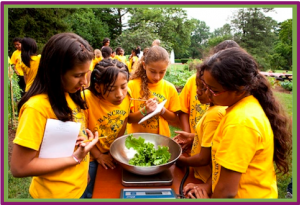With society’s constant pressure for educational and health innovation, it is no wonder that academic studies of garden-based learning and food literacy programs has started to accumulate. Williams and Dixon and Gatto et. al provide insight into the academic understanding of the benefits of garden-based learning programs to students.

9.
Williams and Dixon provide a much needed synthesis study on reported academic outcomes of garden-based learning. They find very positive relationships between garden-based learning and academic achievement, with the highest correlation for science performance followed by math, and then language arts. They analyzed studies from 1990-2010 that included: a garden-based curriculum, measured academic outcomes, a minimum of one hour at least every two week in the garden, a connection with schools, and assessment measures were age-group specific. Most of these studies were concentrated in 3rd through 6th grade students. A theme for the positive outcomes of many studies was the relevance and hands-on nature of the educational experience with visual and real world, interactive opportunities. The analysis also looked at the indirect academic benefits to garden-based learning, such as positive environmental attitudes. Though most found a positive relationship, some were statistically insignificant.
Unfortunately, most studies did not report on race, ethnicity, or socioeconomic status, which takes away part of the social justice message of garden-based learning. Though it is just one study rather than a synthesis of years of research, Gatto et. al’s study of the impact of the LA Sprouts gardening and food literacy program on Latino youth in underserved areas of Los Angeles provides an important nuance to the academia on garden-based learning. This is a grassroots solution to food and environmental justice issues in the urban city and the sociological factors surrounding place and context of the garden and learning experience are critical. The LA Sprouts study compared 4th and 5th grade Latino students participating in an urban garden-based learning and food literacy after school program with control students. This study is an important accompaniment to the Williams and Dixon synthesis because it addresses the many more positive outcomes for youth in garden-based learning, beyond just academic and indirect academic outcomes.
Overall, Gatto’s study found that LA Sprouts participants increased their preference for fruits and vegetables from the control group and they had improved perceptions that vegetables from the garden were better than those from the supermarket. Gatto’s contribution to the literature puts the hundreds of positive outcomes found in WIlson and Dixon’s study and provides a sense of place, community, and social justice to the issue. At the grassroots level, especially in urban settings, this is the underlying goal.
Together, the two studies again show the diversity in motivations and positive outcome potential for garden-based learning and food literacy programs. They can appeal to hardcore classroom results focused groups (there was a positive correlation in academic subject outcome) as well as the more generally healthy living groups (improving preferences for healthy foods).
The “pilot” nature of Gatto’s study, and the direct plea for more quantity and quality research by Williams and Dixon in the garden-based learning field shows this is an emerging field, despite its history, and the increasing pressure from the grassroots may increase interests from academics– especially as the studies of positive relationships between student academic outcome and wellbeing continue to compile.
Gatto, N.M, et. al. “LA Sprouts: A Garden-Based Nutrition Intervention Pilot Program Influences Motivation and Preferences for Fruits and Vegetables in Latino Youth.” Journal of the Academy of Nutrition and Dietetics. 112.6 (2012): 913-920. Web.
Williams, Dilafruz R. and P. Scott Dixon. “Impact of Garden-Based Learning on Academic Outcomes in Schools: Synthesis of Research Between 1990 and 2010.” Review of Educational Research. 83.2 (2013): 211-235. Web.
